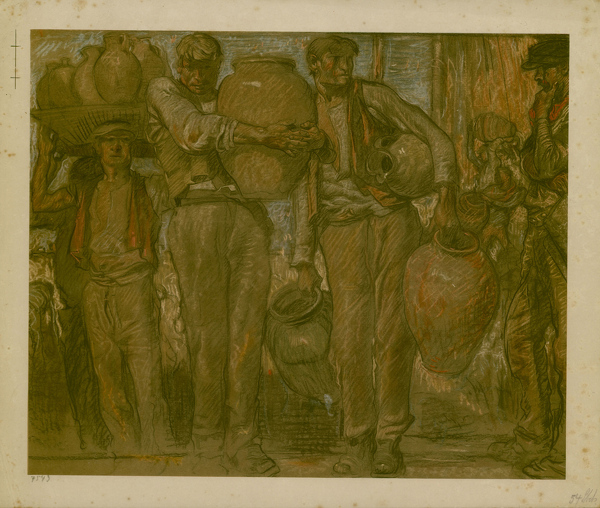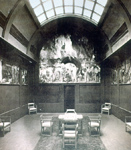Provenance: Provenance: from the artists own collection; gifted to Count William de Belleroche; with him until 1961, thereafter private collection.
Work was one of Ten designs for the Committe Luncheon Room, Lloyd's Register of Shipping, Fenhurch Street, London, 1908-1914
Work 'was reproduced in an edition of 25 - one set of which is in the collection of the Science Museum. This unnumbered proof set, belonged to Brangwyn personally and was gifted by him to Count William de Belleroche.
The Committee Luncheon Room, for Lloyd’s Register of Shipping, Fenchurch Street, London was decorated by Brangwyn from 1908-1914. The scheme comprised ten paintings in Tempera on canvas: 4 panels measuring 137.2x121.9cm (4ft 6inx4ft), 4 panels measuring 137.2x243.8cm (4ft 6inx8ft), 2 panels measuring 137.2x91.4cm (4ft 6inx3ft).
The commission was gained through Sir Thomas Lane Devitt, then Chairman of Lloyd’s Register of Shipping. The panels, illustrating porters in the London docks, were removed in the late 1960s, stored and subsequently lost. Prior to being placed in Lloyd’s the rectangular panels were exhibited in the Brangwyn Room at the Ghent International Exhibition (A2292), 1913. The subjects included Rug Porters, Meat, Tea & Suger, Curios & Coal.
Brangwyn was a fervent believer that art should be accessible to all, regardless of wealth or station, which probably explains his interest in autographic processes. A mass produced printed work was obviously considerably more affordable for the general population than a one-off oil painting. Although Brangwyn cut corners – he would rework an image in a variety of media and frequently recycled areas of etching plates to produce another print run – he appeared to give his printed work as much attention to detail and composition as his original pieces.
His interest in printing processes is reflected in the fact that he was made an Associate and Fellow of the Royal Society of Painter-Printmakers in 1903; was the first President of the Society of Graphic Art in 1921, a group which exhibited both drawings and prints at the Royal Institute galleries from 1921 to 1940; and was an active member of the Senefelder Club founded in 1909, succeeding Joseph Pennell as President.Work was one of Ten designs for the Committe Luncheon Room, Lloyd's Register of Shipping, Fenhurch Street, London, 1908-1914










